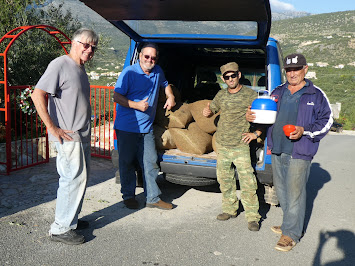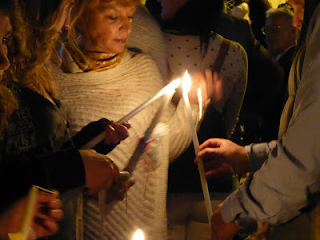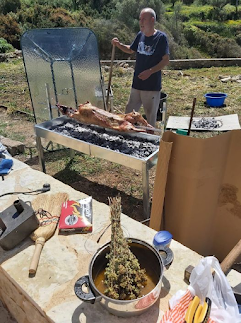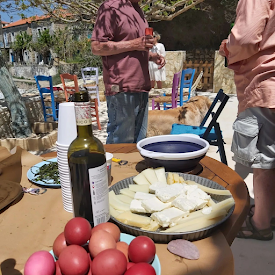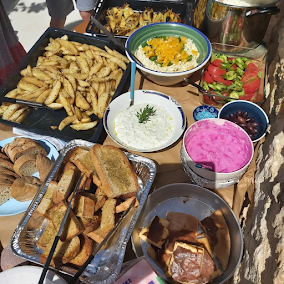That title,' The Night of the Kounabi' has a rather exotic ring to it, doesn't it? You could conjure up images of romance, mystery or danger when reading it.
 |
| Night of the Kounabi - Stone House on the Hill |
My original title for this report about life in rural Greece had a much better alliteration, as it was, 'The Night of the Nyfitsa'.
 |
| Google photo, Kounabe, - night visitor |
But you have to tell it like it is, or in this case, was, when writing about expat life. And further research - not to mention, the word of wise, long-time locals -- clarified that it was a kounabi (coo-nah-vee) or pole cat (aka, stone martin) and not a nyfitsa (nee-fit-saw), a weasel, who had us up at 4 a.m. on a very hot, sweat-inducing summer's night; made even hotter by the fact the animal was in our house!
 |
| Our House on the Hill in Rural Greece |
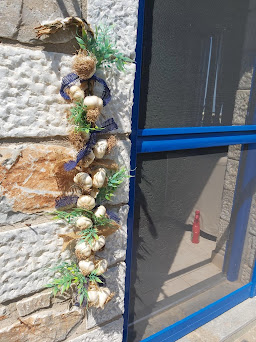 |
| Garlic at my door - ward off evil |
In Greece there is a belief that garlic swags hung at the front door ward off evil. It may be keeping evil from our Stone House on the Hill, but isn't deterring the occasional visiting varmint.
Luckily our visitor was as terrified of us as we were of him, so he made a mad dash for freedom as soon as enough doors were opened to allow for his escape. (He had entered, we believe, in the dark of night as I was on the deck dealing with our outside cat and had left the door to the house open.) At the advice of those same long-time locals mentioned above, we will be spraying our outside deck walls with Tabasco sauce and hanging moth balls from plants near the deck to discourage further visits.
Leaving the Comfort Zone
 |
| View from our neighborhood |
Situations in expat life - not as exciting as chasing wild animals in the middle of the night --often leave us on the edge of our comfort zone and certainly force us to rethink our behaviors and routines. We are amazed at how our attitudes towards situations have shifted in recent years. While some things that used to leave us 'in a tizzy' barely get a nod of attention, while other things can still drive us right up the proverbial wall.
Take, for example, the matter of water. Just this week we've been dealing with what seems the never ending summer saga of a short supply of domestic water in our slice of Greece. While we've not yet had to order water for our home from a private supplier we are braced for it, as our water tank has sunk to low levels a couple of times already and the summer is young. We've shortened showers, limited laundry and have begun using kitchen-generated gray water on plants. These are all behaviors we never used back in the States but are perfecting them here.
 |
| Our slice of Greece |
We recall asking at the time we purchased the house, from where the domestic water came and recall being greatly relieved that the answer was 'the municipal lines'. We wouldn't need worry about a well drying up. What we didn't even consider was the possibility of the municipal water drying up. A continual source of water to our homes isn't something Americans often think about, so who was to question a guaranteed source like 'the municipality'?
 |
| Domestic water delivery to our home 2020 |
And ours is not unlike situations throughout this arid country. When summer comes, and with it, the part-time residents returning to homes and gardens and tourists filling our hotels, water consumption goes up while the supply stays minimal at best.
The authorities here seem to deal with it by turning the water on to certain sections of the valley for a few days while others use the municipal water stored in their tanks (every home has such tanks as do commercial facilities). Then after a few days, they reverse the valves and those getting water turn to their storage tanks in what proves to be a continually frustrating process because for many the tanks go empty before the supply is returned.
 |
| Summer means lots of tourist fun and low water for residents |
The situation usually resolves itself in the fall when visitors leave, and the rains begin and the season of plentiful water begins. We find we no longer fret about it as we did in the first few years of our residency.
 |
| Sunset from the Stone House on the Hill |
On the flip side, we aren't yet quite as blase' when dealing with bureaucracy (of course, we weren't back in the States either).
Last week we returned to our regional Immigration office to see why our residency permit application on-line status kept saying, 'documents needed'. Our initial application in April included every document they required.
We submitted fingerprints in early June along with other biometric data, per their request. What more could they want?
 |
| Greek residency permit cards - the wait continues |
The information has been submitted, again. Authorities say they have it. Our wait continues. . .
On the Flip Side
The story of expat life isn't only one of living at the edge of one's comfort zone or confronting novel situations as the one I told at the beginning of this tale. It really is a story of our world expanding in so many ways, including so many new friends, since moving to this fishing village in the Peloponnese.
 |
| Captain Antonis and his boat |
A few weeks ago, I gave one of our fishermen friend's, Captain Antonis, a set of photos I had taken of him putting his boat back in the water at the start of the season. We've had a passing acquaintance for several years; always a greeting, smile, nod and wave when we see each other in the village. He thanked me profusely for the prints. A few days ago he stopped us as we were walking through the village and told us to wait 10 minutes - had had something at his house for us and he set off at a fast trot to get it. We went into the local clothing store to await his return and to visit with our friend Sophia who runs it each summer.
Sure enough in 10 minutes he returned with a jar of homemade eating (Kalamata) olives for us! We had barely thanked him when Sophia asked if we liked honey - we assured her we did. She reached under the counter and pulled out a big jar of honey - "Well, then - you must take this home with your olives," she said.
 |
| Gifts from the heart - honey and olives |
The spontaneous generosities, the kindness and the warmth of this new world so far outweigh its challenges. Our fellow expats all have similar stories of those frustrations that have made them pause and wonder if it is worth the effort. But they also have tales, like us in the clothing store, when you experience a moment best described by s my fellow expat and too-soon-departed friend, Marti, as being those that 'make your heart sing'!
 |
| Pantazi Beach near our home - Agios Nikolaos |
That's it for this week from The Stone House on the Hill. We hope where ever you are reading this that you are finding moments to make your heart sing and that your life is free of varmints. Our wishes for safe travels and many thanks for being with us today!
Linking soon with:


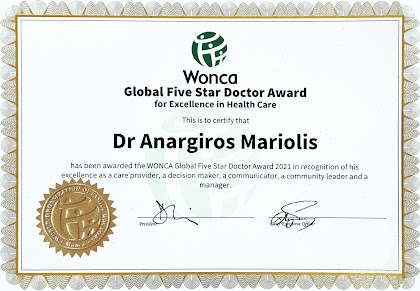







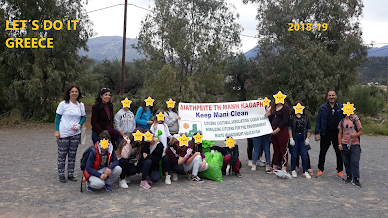





.png)







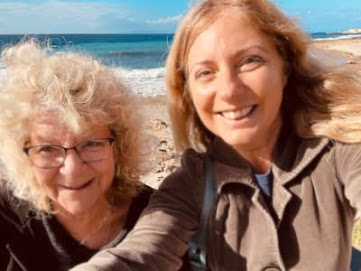
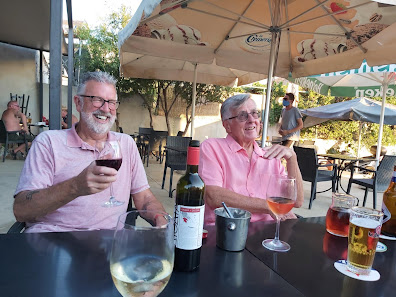
.JPG)



